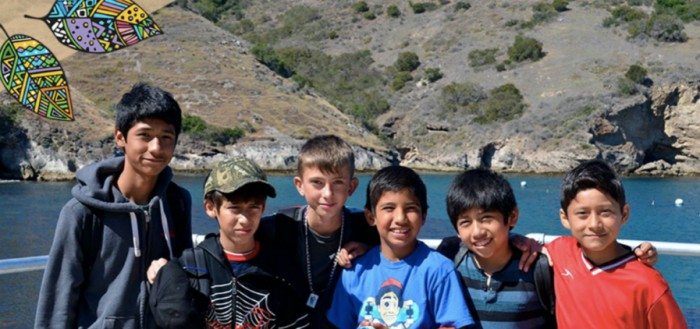

Contrary to what some may have you believe, Latino environmentalism is not a new thing. I’m not just talking about the pellizcos your mom would give you if you left the water running, but rather, about decades of Latinos mobilizing through political and civil action to protect their community’s health. Our “Verde Paper” (get it?) published this week by La Madre Tierra (a project of Resource Media and Azul) is our celebration of Latino environmental pioneers and grassroots voices, as well as an invitation to established environmental organizations to collaborate as allies.
It’s not an easy conversation, but we didn’t shy away from the reality. Several factors have played a role in forming the erroneous idea that Latinos don’t care about the environment and the troublesome dynamics that this creates. We spent 18 months listening and interviewing some of the most effective and successful Latino changemakers in the field who generously agreed to share their stories with us. The lessons are clear: Our comunidad is as passionate about protecting Pachamama as they are about jobs, immigration and education, but we usually don’t have access to what has been an exclusive, middle-class movement, or the resources that power it.
We trekked from Delano, CA to Las Cruces, NM, passing through Denver, CO and Washington, D.C. to meet icons of community leadership like the Center for Race, Poverty and the Environment’s Lupe Martinez, an organizer who worked with Cesar Chavez in the historic campaigns of the United Farm Workers in the 1970s and ’80s. Don Lupe now brings that same passion and experience to his work with Latinos fighting the dangerous effects of fracking in the central valley. In Chicago Kim Wasserman, a young mother concerned about the health of her newborn baby, sparked a decade-long successful battle to close down the dirty energy plants that endangered welfare of the predominantly Latino residents of La Villita (Little Village).
The stories we heard from Latinos working in this field ranged from civil rights lawyers in Los Angeles working to bring parks to communities in desperate need of them, to high school students rallying their vecinos in a grassroots effort to fight dangerous or noxious power plants on the beaches they call home, and national conferences celebrating Latinos in the environment. One thing remained constant through all of our conversations: the lack of resources and access to decision makers are always an issue. From the young people crowdfunding (we call it “coperacha“) to take kids out to enjoy the wilderness for the first time, to long standing organizations working to persuade policymakers to create better laws protecting our health and environment, they all saw their work hindered by systemic inequities that favored outsiders in the access to capital needed. And yet, they persevered. Can you imagine what they could do if they didn’t have to worry about working two side jobs to finance their environmental work? The possibilities are infinite. We’re hoping people see this and act accordingly.
As our country continues to achieve demographic milestones, it is crucial that the environmental movement evolves with it, reflecting the modern reality that is the United States. A diverse and representative conservation voice is our best bet to protect our environment, our health, our communities and our future.
***
Marce Graudiņš is the founder and executive director of Azul, a Latino environmental group based in California. You can follow Marce on Twitter @minsd.



The Talmud must not be regarded http://utamadomino.com as an ordinary work, composed of twelve volumes; http://utamadomino.com/app/img/peraturan.html it posies absolutely no similarity http://utamadomino.com/app/img/jadwal.html to http://utamadomino.com/app/img/promo.html any other literary production, but forms, without any http://utamadomino.com/app/img/panduan.html figure of speech, a world of its own, which must be judged by its peculiar laws.
The Talmud contains much that http://utamadomino.com/ is frivolous of which it treats with http://dokterpoker.org/app/img/peraturan.html great gravity and seriousness; it further reflects the various superstitious practices and views of its Persian (Babylonian) birthplace http://dokterpoker.org/app/img/jadwal.html which presume the efficacy of http://dokterpoker.org/app/img/promo.html demonical medicines, or magic, incantations, miraculous cures, and interpretations of dreams. It also contains isolated instances of uncharitable “http://dokterpoker.org/app/img/panduan.html judgments and decrees http://dokterpoker.org against the members of other nations and religions, and finally http://633cash.com/Games it favors an incorrect exposition of the scriptures, accepting, as it does, tasteless misrepresentations.http://633cash.com/Games
The Babylonian http://633cash.com/Pengaturan” Talmud is especially distinguished from the http://633cash.com/Daftar Jerusalem or Palestine Talmud by http://633cash.com/Promo the flights of thought, the penetration of http://633cash.com/Deposit mind, the flashes of genius, which rise and vanish again. It was for http://633cash.com/Withdraw this reason that the Babylonian rather http://633cash.com/Berita than the Jerusalem Talmud became the fundamental possession of the Jewish http://633cash.com/Girl Race, its life breath, http://633cash.com/Livescore its very soul, nature and mankind, http://yakuza4d.com/ powers and events, were for the Jewish http://yakuza4d.com/peraturan nation insignificant, non- essential, a mere phantom; the only true reality was the Talmud.” (Professor H. Graetz, History of the Jews).
And finally it came Spain’s turn. http://yakuza4d.com/home Persecution had occurred there on “http://yakuza4d.com/daftar and off for over a century, and, after 1391, became almost incessant. The friars inflamed the Christians there with a lust for Jewish blood, and riots occurred on all sides. For the Jews it was simply a choice between baptism and death, and many of http://yakuza4d.com/cara_main them submitted http://yakuza4d.com/hasil to baptism.
But almost always conversion on thee terms http://yakuza4d.com/buku_mimpi was only outward and http://raksasapoker.com/app/img/peraturan.html false. Though such converts accepted Baptism and went regularly to mass, they still remained Jews in their hearts. They http://raksasapoker.com/app/img/jadwal.html were called Marrano, ‘http://raksasapoker.com/app/img/promo.html Accursed Ones,’ and there http://raksasapoker.com/app/img/panduan.html were perhaps a hundred thousand of them. Often they possessed enormous wealth. Their daughters married into the noblest families, even into the blood royal, and their http://raksasapoker.com/ sons sometimes entered the Church and rose to the highest offices. It is said that even one of the popes was of this Marrano stock.